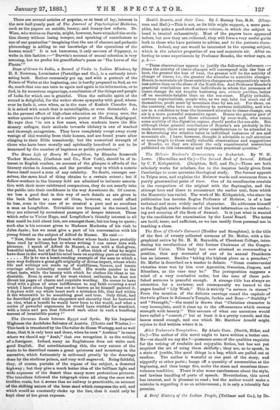Health Resorts, and their Uses. By J. Burney Yeo, M.D.
(Chap- man and Hall.)—This is not, as its title might suggest, a were pain- phlet, but quite a good-sized octavo volume, in which the subject in hand is treated exhaustively. Most of the papers have appeared before, but now they are collected, they will form a very useful guide both to those who have patients to advise, and to the patients them- selves. Indeed, any one would be interested in the opening subject, which is the relative properties of sea and mountain air. After re- ferring to some experiments by Professor Beneke, the writer says, on p. 5 :— "These observations appear to justify the following inference :— Since the activity of tissue-changes will correspond with the 'loss of heat, the greater the loss of heat, the greater will be the activity of change of tissue, i.e., the greater the stimulus to nutritive changes. Hence, in mountain air these nutritive changes are comparatively much less active than on the shore of the North Sea. And Professor Beneke's practical conclusions are that individuals in whom the processes of tissue.change do not require hastening are, cceteris paribus, better off on mountain-heights than on the sea-coast. Highly irritable, nervous organisations, people who, as we say, take too much out of themselves, profit more by mountain than by sea air. For those, on the contrary, who have no tendency to nervous irritability, and who are in a condition to bear the increased stimulus to tissue-change, sea air is a more powerful restorative agent. Hence the greater part of scrofulous persons, and those exhausted by over-work, who retain some activity of the digestive organs, should prefer the sea-side. But although these general conclusions of Beneke's are probably in the main correct, there are many other considerations to be attended to in determining the relative value in individual instances of sea and mountain air. I have, however, thought it advisable to call attention at some length to these really valuable observations and suggestions of Beneke, as they are almost the only experimental researches published on this interesting and important practical question."






































 Previous page
Previous page